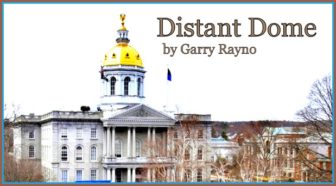 Distant Dome is co-published by Manchester Ink Link and InDepthNH.org
Distant Dome is co-published by Manchester Ink Link and InDepthNH.org
By GARRY RAYNO, Distant Dome
This session the House and Senate are at odds over taxes.
Last week the House decided a key element of the “Recovery Friendly Workplace Initiative” touted by Gov. Chris Sununu and others need more work and sent Senate Bill 563 to interim study, a polite death in the second year of the two-year term.

Gov. Chris Sununu, R-NH
The bill establishes a tax credit for donations made to the Community Development Finance Authority for the initiative.
Participating businesses could receive credits totaling up to $6 million a year against their business taxes.
The bill passed the Senate on a voice vote, but found opposition in the House Ways and Means Committee whose members believe the methodology had not been sufficiently crafted and there is that little issue of lost revenue.
Business taxes are the lifeblood of the state’s revenue system accounting for about 27 percent of all general and education fund revenue.
Business tax rates were reduced the past two fiscal years, but the returns continue to grow.
Three-quarters through the 2018 fiscal year, business taxes — profits and enterprise — reached $465. 3 million, which is $49.7 million more than budget writers’ estimates and $61.7 million more than collected at this point in fiscal 2017.
For March, one of the largest business tax collection months, business tax revenues were $102.8 million, $12.5 million more than estimates.
So business tax revenues are not an issue and the $6 million could easily be found if House members wanted to, but they did not.
Homeowner break
The House Ways and Means Committee also wants to send a bill giving first-time homeowners a break on the real estate transfer tax.
The Senate voted 19-4 to approve Senate Bill 301 with supporters saying it would help young people buy a home.
The bill would reduce the rate from 75 cents to 50 cents per $1,000 of valuation for homes selling for $300,000 or less for first-time home buyers.
The break would be retroactive to Jan. 1 and be good this year and next.
However, members of the House Ways and Means Committee had a number of concerns including whether it would constitutional under the equal and proportional taxation requirement, And others noted many homes in the North Country would qualify under the $300,000 limit while few would be eligible in southern New Hampshire.
The committee voted 22-1 to send the bill to interim study. The House votes on that recommendation Thursday.
Research and Development
Another bone of contention is research and development tax credits.
For many years the research and development tax credit — which was first instituted in 1992 to help bring the state out of the major recession that claimed five of the state’s largest banks — has been $1 million or $2 million.
At the $2 million level companies applying for the credit were receiving about 25 percent of what they qualified for due to the demand.
Last legislative session, lawmakers raised the cap from $2 million to $7 million to allow more companies to realize greater benefits.
However, the House decided earlier this session the cap should be reduced back to the $2 million limit and use the money saved to increase the filing threshold for the interest and dividends tax.
Under House Bill 1554, the threshold would rise from $2,400 to $3,500 before someone would be taxed, and raised the exemption even more for the blind and disabled.
The Ways and Means Committee voted 13-10 to recommend the bill pass, which the House did 182-143.
The bill is not likely to find a lot of support in the Senate because of the research and develop credit reduction, although the new interest and dividends thresholds may be attractive.

Rep. Timothy Lang
So the House Ways and Means Committee decided to tack on the tax credit cut to a Senate passed bill to annually survey companies using the research and development tax credit to help determine its effectiveness.
Committee member Rep. Timothy Lang, R-Sanbornton, said the change would make the bill consistent with HB 1554 by reducing the tax credit.
But Rep. Susan Almy, D-Lebanon, implied the credit reduction could kill the bill, noting information from the survey is needed to determine the effectiveness of the tax credit.

Rep. Susan Almy
“The minority feels this decision should not be made without the data from the survey,” she said.
The committee voted 12-11 to add the research and development tax credit reduction to the bill.
The House will vote on the bill Thursday.
Sign of the Times
The Senate Thursday is expected to approve a bill that would pay a public school employee’s family a death benefit of $100,000 if the person is killed while performing his or her job.
The death benefit for educators and other public school staffs including employees at the university and community college systems is similar to those for the families of police and firefighters that have been law for some time.
In years past attempts to add educators failed to garner enough support to pass.
But the death of school employees in recent public school shootings like the one in Florida in February may have helped to change a few minds.
The bill was not a slam dunk in the House passing on a 176-161 vote, but is on the Consent Calendar in the Senate, which means one voice vote will pass a number of “non-controversial” bills.
House Bill 1554 will most likely go to Senate Finance after it passes the Senate.
The $100,000 benefit would be paid out of funds “not otherwise appropriated,” which means find the money somewhere.
Voting change
A public hearing will be held this week on House Bill 1264 which would essentially create a residency requirement to vote and is bound to produce a crowd.
Similar to a House Bill 372, opponents say it is a poll tax on students and others who may live here but don’t necessarily claim New Hampshire as their residence which would require a New Hampshire driver’s license and registering a vehicle in the state.
Supporters say only state residents should be able to vote in state elections not people who are here briefly and have no intentions of staying permanently.
HB 1264’s public hearing before the Senate Election Law and and Internal Affairs Committee is at 10 a.m. Tuesday in Room 102 of the Legislative Office Building.
Marsy’s Law
The proposed constitutional amendment CACR 22 that would give crime victims and their families constitutional rights on par with a defendant’s constitutional rights will have a joint public hearing this week before the House Criminal Justice and Public Safety, and the Judiciary committees.
California billionaire Henry Nicholas is behind the national initiative named for his sister Marsy, who was killed by her ex-boyfriend in 1983.
While the proposed constitutional amendment has broad support in New Hampshire including Gov. Chris Sununu, it also has its detractors including the state American Civil Liberties Union.
The hearing will be held Tuesday at 10 a.m. in rooms 206-208, of the Legislative Office Building.
Berlin Power
A bill requiring the Public Utilities Committee to revisit its order on the Burgess BioPower plant in Berlin will also have a public hearing this week.
The current PUC order approved a purchased power contract between Eversource and the wood-burning power plant above wholesale market rates to help support the plant and the North Country’s wood industry.
The order caps Eversource ratepayer costs at $100 million, a threshold approaching faster than anticipated.
Supporters would like to see the cap raised or eliminated and say otherwise the plant will have to close.
Senate Bill 577’s public hearing before the House Science, Technology and Energy Committee is Wednesday at 1:30 p.m. in rooms 205-207 of the Legislative Office Building.
Garry Rayno can be reached at garry.rayno@yahoo.com
Distant Dome by veteran journalist Garry Rayno explores a broader perspective on the State House and state happenings. Over his three-decade career, Rayno covered the NH State House for the New Hampshire Union Leader and Foster’s Daily Democrat. During his career, his coverage spanned the news spectrum, from local planning, school and select boards, to national issues such as electric industry deregulation and Presidential primaries. Rayno lives with his wife Carolyn in New London.





